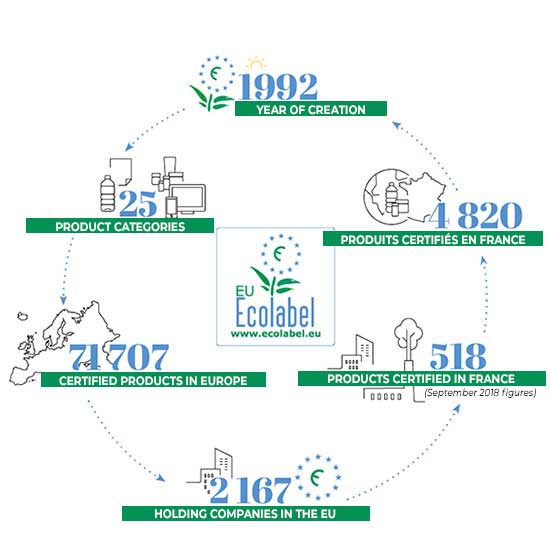
The European Ecolabel is an official ecological label, the only one recognized in all EU countries. More than 70,000 products bear the little flower logo. A sign that attests to their quality of use and limited environmental impact. And it’s available to certain departments!
The European Ecolabel (EE) was born in 1992, a year after the creation of NF Environnement, the French green label in the NF range. Like it, it complies with the ISO 14024 standard. Symbolized by a small flower, it is the only official European eco-label that can be used in all EU member countries. It guarantees the same qualities as an object of similar use on the market, while minimizing its impact on nature.
All consumer goods are eligible for the European Ecolabel, with the exception of food products, medicines for human or veterinary use, and medical devices. Today, over 70,000 products in 25 different categories, including one service(tourist accommodation), bear this logo.
After Italy and Spain, France is the country with the most references. Dishwashing liquid, laundry detergent, toilet paper, shower gel, hygiene and cleaning products and tourist accommodation are the products bearing the EE label most frequently used by French consumers. More than 7 out of 10 know the logo. Meanwhile, public purchasers in France are increasingly demanding that textiles, photocopier paper and multi-purpose cleaners carry the European Ecolabel in their invitations to tender. An example of responsible purchasing!
European Ecolabel: less impact on several criteria

To obtain the European Ecolabel, products must comply with precise specifications that take into account the product’s entire life cycle (raw materials, distribution, consumption and recycling). Each standard is drawn up by the European Commission on the basis of life cycle analyses (LCAs) and consultation with stakeholders: manufacturers, associations and public institutions. The main requirements of the green label relate to product lifespan, contribution to climate change, energy, water, biodiversity, waste, discharge of hazardous substances…
The European Ecolabel encourages continuous improvement in environmental performance. To this end, requirements are reviewed on average every four to five years, before a certified product category exceeds 20% market share. In France, ADEME supports national policy on the European ecolabel, promotes it and participates in the development of standards. The certification body that issues it on its behalf is AFNOR Certification. SMEs and VSEs can benefit from financial assistance to get started, under ADEME’s Tremplin scheme, backed by the stimulus plan.